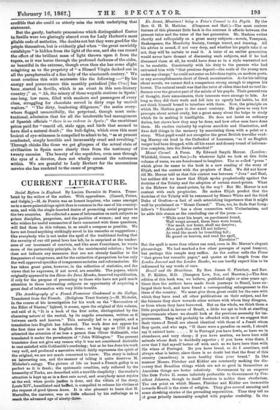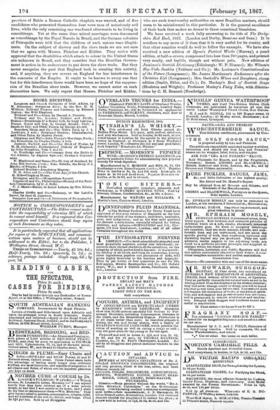Brazil and the Brazilians. By Rev. James C. Fletcher, and
Rev. D. P. Kidder, D.D. (Sampson Low, Son, and Marston.)—The first edition of this book was, we believe, published eight or nine years ago. Since then the authors have made fresh journeys to Brazil, have en- larged their book, and have found a corresponding enlargement in the ideas of the country. We must give thorn groat credit for the care with which they have read all other publications on their subject, and for the fairness they show towards other writers with whom they disagree, or from whom they have borrowed. But on the whole, we think them a little prejudiced in favour. of Brazil, a little too apt to look at startling improvements where we should look at the previous necessity for im- provement. They will probably be offended with us if we suggest that their views of Brazil are almost identical with those of a Jesuit whom they quote, and who says, "If there were a paradise on earth, I should say it existed hero If in Portugal you have fowls, no have we in abundance, and very cheap ; if you have mutton, we have here wild animals whose flesh is decidedly superior ; if you have wine there, I aver that I find myself better off with such as we have here than with the wines of Portugal. Do you have broad, so do I sometimes, and always what is better, since there is no doubt but that the flour of this country (mandioca) is more healthy than your bread." In like manner Messrs. Fletcher and Kidder aro constantly making the dis- covery that Brazilian things which are not so good in themselves as American things are better relatively. Government by an emperor like Dom Pedro II. seems infinitely preferable to Government by Pre- sident Johnson, though in itself freedom is nobler than absolutism. The one point on which Messrs. Fletcher and Kidder are inexorable towards Brazil is the state of religion. They give several amusing and some shocking stories of the prevailing superstition. Thus they tell us of great priestly immorality coupled with popular credulity. In the province of Bahia a Roman Catholic chaplain was wanted, and of five candidates who presented themselves four were men of notoriously evil lives, while the only remaining one was found afterwards to be living in concubinage. Yet at the same time mixed marriages were denounced as concubinage by the Papal Nuncio in Brazil, and the German colonists of Petropolis were told that the children of such unions were illegiti- mate. On the subject of slavery and the slave trade we are not sure that we agree with Messrs. Fletcher and Kidder. They notice with approval that the disabilities which attach to colour in the United States are unknown in Brazil, and they consider that the Brazilian Govern- ment is active in its endeavours to put down the slave trade. But they never recognize the part that England took in creating this activity, and, if anything, they are severe on England for her interference in the concerns of the Empire. It ought to be known to every one that but for this interference there would have been no hope of the suppres- sion of the Brazilian slave trade. However, we cannot enter on such discussions here. We only regret that Messrs. Fletcher and Kidder,
who are such trustworthy authorities on most Brazilian matters, should seem to be misinformed in this particular. It is the general excellence of their book that makes us demur to these occasional blemishes.































 Previous page
Previous page